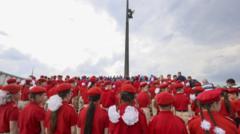The campaign to instill love for Russia among children in occupied eastern Ukraine is gaining momentum, with alarming implications for the future of Ukrainian identity. In Luhansk, nursery school children are seen proudly displaying a Russian military banner in the shape of the letter Z—a symbol of Russia’s invasion—while chanting patriotic songs. In Anthracite, youngsters are engaged in creating items like blankets and candles for Russian soldiers, reflecting a coordinated effort to draw these children into Russia’s ideological fold.
To effectuate this transformation, Moscow has resorted to luring Ukrainian teachers out of the region by offering substantial financial incentives to Russian educators willing to relocate. This shortage of Ukrainian teaching staff is being strategically used to impose a new curriculum that prioritizes Russian nationalism over Ukrainian heritage.
At the forefront of this indoctrination is Yunarmia, Russia’s youth military organization. Now extending its reach into occupied Ukrainian territories, Yunarmia aims to provide "skills" that will benefit children if they choose to enter military service. Run by individuals like Fidail Bikbulatov, who previously led a youth division for the ruling United Russia party, Yunarmia’s activities have drawn sanctions from both the UK and EU, with accusations of "brainwashing" and "militarisation" of youth.
Moreover, other state-sponsored entities, such as "Movement of the First Ones" and "Warrior," have established their presence with the objective of promoting military training and patriotic education, often through competitions rooted in the Soviet past. These initiatives compel children to demonstrate knowledge in military history and engage with firearms training.
As lessons unfold in occupied schools, children are submerged in a Russian-language curriculum filled with narratives that paint Ukraine as an artificial construct. Reports from former students, like Lisa who shared her experience after fleeing to the US, portray coercion in participating in forced events celebrating Russia, including regular National Anthem sessions with strict consequences for noncompliance.
Additionally, Russian soldiers partake in classroom discussions that glorify their military actions while depicting Ukrainian forces in a negative light, further embedding a pro-Russian ideology among youngsters. Outside academic settings, children are taken to exhibitions extolling Russia and its military campaigns, reinforcing the state’s messaging.
Russia’s initiative to transfer Ukrainian children into its own territory under the guise of “integration” has come under scrutiny as well, particularly since over 19,000 Ukrainian children have reportedly been forcibly removed, with thousands returning to face harsh re-education programs. This anti-humanitarian strategy, deemed illegal under international law, highlights ongoing acts aimed at erasing Ukrainian identity.
Recent international legal actions, such as the arrest warrant issued against President Putin by the International Criminal Court for the unlawful deportation of children, underline the global condemnation of these actions. Moscow continues to vigorously deny such charges, hoping to secure its political grip not just on territory, but on the beliefs and identities of the youngest generation in Ukraine.




















